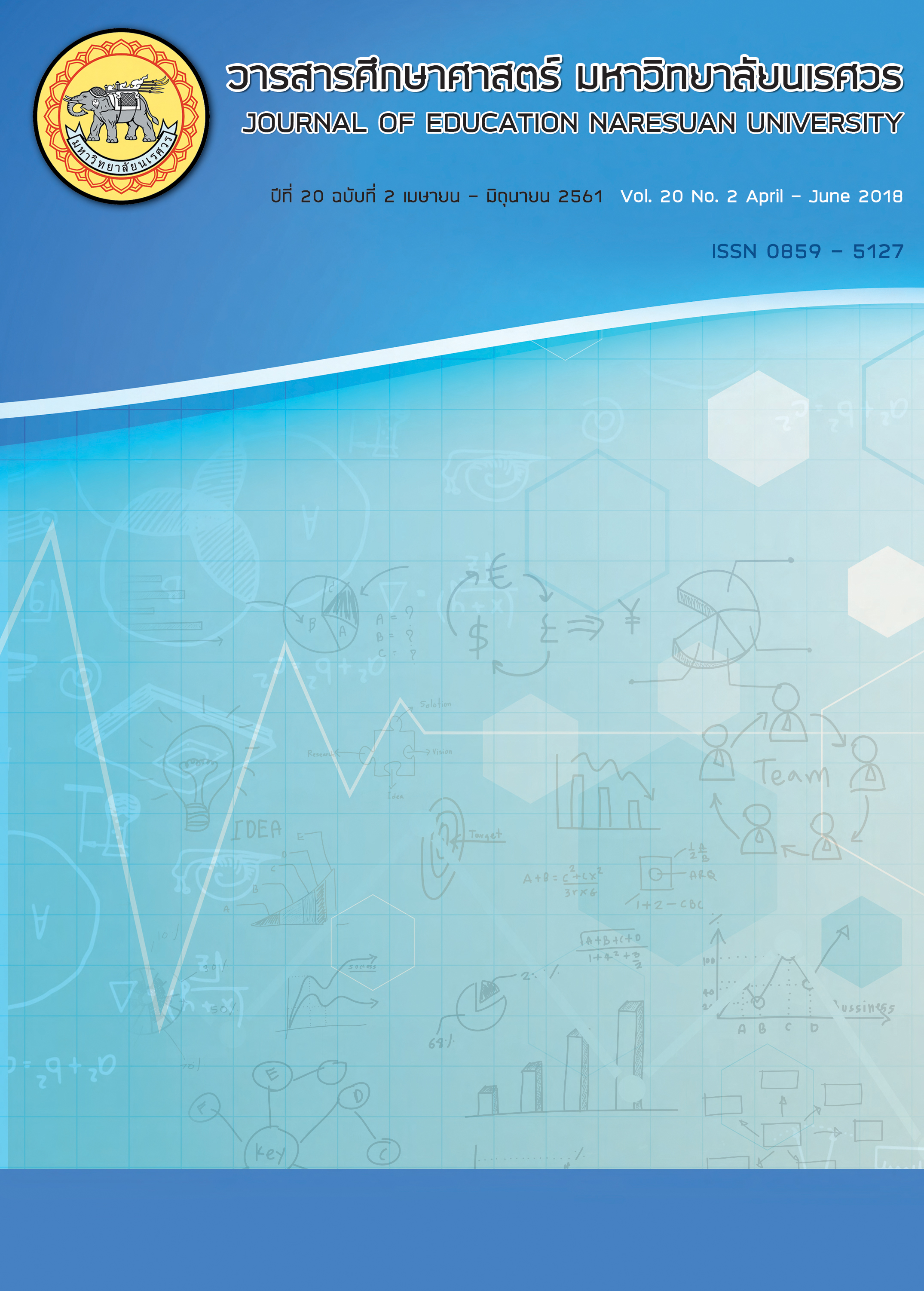การศึกษาผลสัมฤทธิ์ทางการเรียนวิชาชีววิทยาและทักษะกระบวนการกลุ่มของนักเรียนสายวิทยาศาสตร์พิเศษ ชั้นมัธยมศึกษาปีที่ 4 ที่ได้รับการจัดการเรียนรู้แบบร่วมมือเทคนิค TGT; A STUDY OF BIOLOGY LEARNING ACHIEVEMENT AND GROUP PROCESS SKILLS OF A SPECIAL...
Main Article Content
Abstract
การวิจัยครั้งนี้มีวัตถุประสงค์เพื่อศึกษาพัฒนาการด้านผลสัมฤทธิ์ทางการเรียนวิชาชีววิทยาและทักษะกระบวนการกลุ่มของนักเรียนสายวิทยาศาสตร์พิเศษ ชั้นมัธยมศึกษาปีที่ 4 ที่ได้รับการจัดการเรียนรู้แบบร่วมมือเทคนิค TGT งานวิจัยนี้ใช้รูปแบบการวิจัยเชิงปฏิบัติการในชั้นเรียน ประกอบด้วย 4 ขั้นตอน คือ การวางแผน (Plan) การปฏิบัติตามแผน (Act) การสังเกตผล (Observe) และการสะท้อนผล (Reflect) โดยกลุ่มเป้าหมายที่ใช้ในการวิจัย คือ นักเรียนชั้นมัธยมศึกษาปีที่ 4/3 ภาคเรียนที่ 1 ปีการศึกษา 2558 โรงเรียนแห่งหนึ่งในจังหวัดชลบุรี จำนวน 31 คน ซึ่งเป็นห้องเรียนสายวิทยาศาสตร์พิเศษ เก็บรวบรวมข้อมูลโดยใช้ แผนการจัดการเรียนรู้แบบร่วมมือเทคนิค TGT เรื่อง การสืบพันธุ์และการเจริญเติบโตของสัตว์ จำนวน 5 แผน แบบทดสอบย่อยท้ายวงจร แบบทดสอบวัดผลสัมฤทธิ์ทางการเรียนวิชาชีววิทยา และแบบสังเกตพฤติกรรมทักษะกระบวนการกลุ่ม สถิติที่ใช้ในการวิเคราะห์ข้อมูล ได้แก่ ร้อยละ ค่าเฉลี่ยเลขคณิต () ส่วนเบี่ยงเบนมาตรฐาน (S.D.) วิเคราะห์ข้อมูลเชิงบรรยายและใช้การวิเคราะห์คะแนนพัฒนาการสัมพัทธ์เพื่อตอบคำถามงานวิจัย ซึ่งผลการวิจัยสรุปได้ ดังนี้
1. การจัดการเรียนรู้แบบร่วมมือเทคนิค TGT ส่งผลให้นักเรียนมีพัฒนาการด้านผลสัมฤทธิ์ทางการเรียนวิชาชีววิทยาสูงขึ้นโดยมีคะแนนพัฒนาการ ร้อยละ 65.44 ซึ่งอยู่ในระดับสูง
2. การจัดการเรียนรู้แบบร่วมมือเทคนิค TGT ส่งผลให้นักเรียนมีพัฒนาการด้านทักษะกระบวนการกลุ่มสูงขึ้นโดยมีคะแนนพัฒนาการ ร้อยละ 81.96 ซึ่งอยู่ในระดับสูงมาก
A STUDY OF BIOLOGY LEARNING ACHIEVEMENT AND GROUP PROCESS SKILLS OF A SPECIAL SCIENTIFIC COURSE 10th GRADE STUDENTS BY USING COOPERATIVE LEARNING TGT TECHNIQUE
The purpose of this research was to study a development of biology learning achievement and group process skill of special scientific course tenth grade students using the cooperative learning TGT technique. The research design was a classroom action research which composed of 4 steps; Plan, Act, Observe and Reflect. The target of this research was 31 tenth grade students who studied in a special scientific course at Chonkanyanukoon school, Meuang Distric, Chonburi Province, in the first semester of the academic year 2015. The equipment of the research was five lesson plans; in the topics were animal reproduction and development, ended cycle tests, science achievement test and student group process skill observation form. The data were analyzed by percentage, mean, standard deviation, development scores and content analysis. The findings were as follows:
1. Biology learning achievement was at a high level, the development score is 65.44% when using the cooperative learning with TGT technique.
2. Group process skill was at a very high level, the development score is 81.96% when using the cooperative learning with TGT technique.
Article Details
The owner of the article does not copy or violate any of its copyright. If any copyright infringement occurs or prosecution, in any case, the Editorial Board is not involved in all the rights to the owner of the article to be performed.
References
Chatakan, W. (2014). Research for educational administration development. Bangkok: Chulalongkorn University Press. (in Thai)
Kanjanarukpong, S. (2004). Educational innovations: 29 techniques of various learning activities in collaborative learning. Bangkok: Tharnaksorn Press. (in Thai)
Kanjanawasee, S. (2013). Classical test theory (7th ed.). Bangkok: Chulalongkorn University. (in Thai)
Khammani, T. (2004). Science of teaching: A body of knowledge for effective learning management (3rd ed.). Bangkok: Chulalongkorn University Press. (in Thai)
Khongmeesup, T. (2011). A comparison of science learning achievement and a scientific mind on ecology of Mathayomsuksa 4 students between cooperative learning model Teams- Games - Tournament (TGT) technique and conventional approach (Master thesis). Lopburi: Thepsatri Rajabhat University. (in Thai)
Kley, M. (1991). Cooperative learning and how to make it happen in your classroom. New Zealand: Macprint.
Lekatarakorn, P. (2015). Enjoy learning in 21st century. Journal of Education Naresuan University, 17(3), 161-163. (in Thai)
Office of Educational Reform. (2002). Educational reform. Bangkok: Kurusapa Printing Ladphrao. (in Thai)
Pitiporntapin, S. (2007). Developing achievement and cooperative skills of Matayomsuksa 5 students using cooperative learning in teaching reproduction of flowering plants (Master thesis). Bangkok: Kasetsart University. (in Thai)
Rangubtook, W. (1999). Student - centered lesson plan. Bangkok: Ton Or. (in Thai)
Ruksompote, P. (2007). A comparison of learning achievement in mathematics, attitudes towards learning mathematics, and interaction among students between the use of cooperative learning (teams-games-tournaments) and conventional approach for Mathayomsuksa 1 students (Master thesis). Phranakhon Si Ayutthaya: Phranakhon Si Ayutthaya Rajabhat University. (in Thai)
Slavin, R. E. (1990). Cooperative learning: theory, research and practice. Englewood Cliffs, New Jersey: Prentice-Hall.
Sutthirat, C. (2010). New way of learning management: Theory, practices, and research result. Nonthaburi: Sahamitr Printing & Publishing. (in Thai)
Techacupt, P. (2001). Learner-centered instruction: concept, teaching method and techniques. Bangkok: The Master Group Management. (in Thai)
Thadkornburee, S. (2013). The Study of Prathomsuksa 5 Students' learning efficiency on "Morale sustaining language" learning unit and their teamwork behavior through TGT cooperative learning technique (Master thesis). Nakhon Ratchasima:
Nakhon Ratchasima Rajabhat University. (in Thai)


